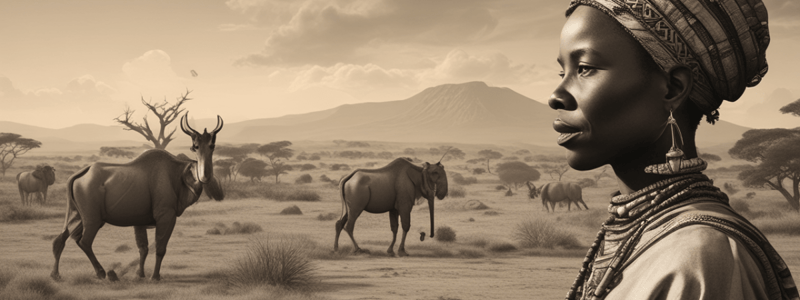Podcast
Questions and Answers
What was the primary goal of the East Africa Company in Kenya?
What was the primary goal of the East Africa Company in Kenya?
- To promote African culture
- To establish a British colony
- To establish trade and economic interests in the region (correct)
- To spread Christianity
Which treaty led to the British taking over the colony from Germany?
Which treaty led to the British taking over the colony from Germany?
- Heligoland-Zanzibar Treaty (correct)
- Treaty of Versailles
- Treaty of Berlin
- Anglo-German Agreement
What was the impact of British colonization on Kenya's natural resources?
What was the impact of British colonization on Kenya's natural resources?
- The British introduced sustainable farming practices
- The British invested in environmental conservation
- The British protected Kenya's natural resources
- The British exploited Kenya's natural resources (correct)
What was the main method of resistance used by the Kenya African Union (KAU)?
What was the main method of resistance used by the Kenya African Union (KAU)?
Who became Kenya's first Prime Minister after independence?
Who became Kenya's first Prime Minister after independence?
What system of government did Kenya adopt in 1964?
What system of government did Kenya adopt in 1964?
What is one of the challenges Kenya has faced in the post-independence era?
What is one of the challenges Kenya has faced in the post-independence era?
What has been a key area of progress in Kenya in recent years?
What has been a key area of progress in Kenya in recent years?
Flashcards are hidden until you start studying
Study Notes
Colonial Period
- German Colonization (1885-1890)
- Germany established the East Africa Company, which led to German colonization in Kenya
- The company's goals were to establish trade and economic interests in the region
- British Colonization (1890-1963)
- The British government took over the colony from Germany after the Heligoland-Zanzibar Treaty
- The British East Africa Company was established to administer the colony
- The colonial period saw the introduction of British culture, language, and customs in Kenya
- The British colonial government exploited Kenya's natural resources and forced Africans to work on plantations and in mines
- Anti-Colonial Resistance
- The Kenyan people resisted colonial rule through various means, including armed rebellion and non-violent protests
- Notable resistance movements include the Mau Mau rebellion and the Kenya African Union (KAU)
Modern Kenya
- Independence (1963)
- Kenya gained independence from Britain on December 12, 1963
- Jomo Kenyatta became the country's first Prime Minister
- Post-Independence Era
- Kenya adopted a presidential system of government in 1964
- The country has experienced periods of political instability, corruption, and ethnic tensions
- Kenya has made progress in economic development, with a growing economy and infrastructure development
- Recent Developments
- Kenya has become a key player in regional and international affairs
- The country has made strides in technology, innovation, and entrepreneurship
- Challenges persist, including corruption, insecurity, and environmental degradation
Colonial Period
- Establishment of German Colonization
- Germany established the East Africa Company in 1885 to advance trade and economic interests in Kenya
- This led to German colonization in Kenya, which lasted from 1885 to 1890
- Transition to British Colonization
- The British government took over the colony from Germany after the Heligoland-Zanzibar Treaty in 1890
- The British East Africa Company was established to administer the colony
- Impact of British Colonization
- British culture, language, and customs were introduced to Kenya
- The British colonial government exploited Kenya's natural resources, including forced labor on plantations and in mines
- Anti-Colonial Resistance
- The Kenyan people resisted colonial rule through armed rebellion and non-violent protests
- Notable resistance movements include the Mau Mau rebellion and the Kenya African Union (KAU)
Modern Kenya
- Independence
- Kenya gained independence from Britain on December 12, 1963
- Jomo Kenyatta became the country's first Prime Minister
- Post-Independence Era
- Kenya adopted a presidential system of government in 1964
- The country experienced periods of political instability, corruption, and ethnic tensions
- Kenya has made progress in economic development, with a growing economy and infrastructure development
- Recent Developments
- Kenya has become a key player in regional and international affairs
- The country has made strides in technology, innovation, and entrepreneurship
- Challenges persist, including corruption, insecurity, and environmental degradation
Studying That Suits You
Use AI to generate personalized quizzes and flashcards to suit your learning preferences.



